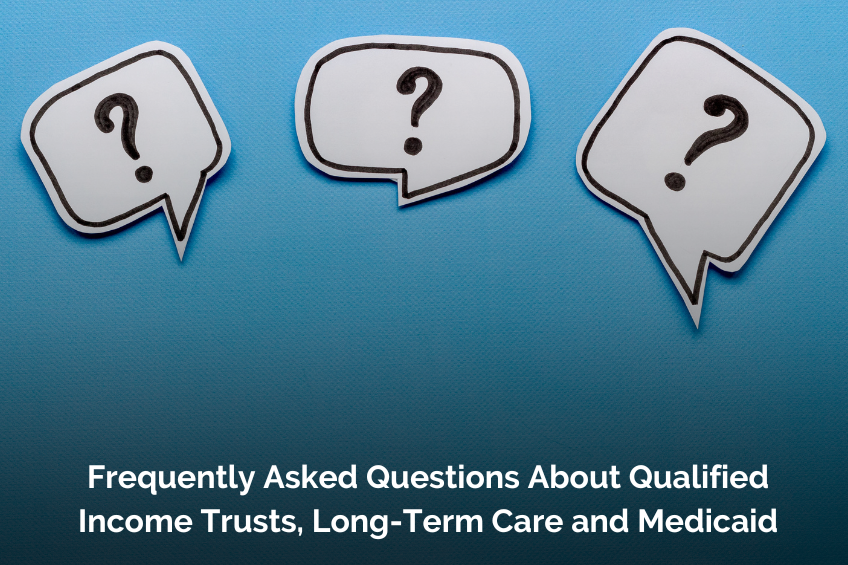
As more Americans are getting older, the question of long-term care and how to pay for it becomes a pressing one.
Many people have wills, advance directives and other estate planning measures in place, but very few have long-term care insurance or plans for how to pay for nursing home care in the future.
Given that the average cost of semiprivate nursing home care in Georgia tops $6,722 a month, according to Caring.com, most people would struggle to afford it. That comes out to $80,664 a year and is far out of reach for many.
The cost if you want a private room at a Georgia skilled nursing facility will run you an average of $7173 a month, totaling more than $86,000 a year.
That is simply much more than most seniors can expect to afford later in life, even with a healthy retirement income.

How a Qualified Income Trust Can Help You Afford Long-Term Care in Georgia
So how will you pay for nursing home care when you need it?
The answer for many is to qualify for Medicaid by setting up a Qualified Income Trust, also known as a Miller Trust.
An experienced estate planning attorney can help you determine whether you might benefit from a Qualified Income Trust.
An attorney can also help you establish one and advise you on how to use it.
What Is a Qualified Income Trust?
A Qualified Income Trust, or Miller Trust, is an irrevocable trust that, when properly set up, will allow the beneficiary to qualify for Nursing Home Medicaid.
Once a senior qualifies for Georgia Medicaid by using a Qualified Income Trust, Medicaid will pay all the expenses beyond what the senior can afford at a skilled nursing home facility in Georgia.
A QIT can be a useful legal tool for those whose monthly income exceeds the Georgia Medicaid income limit.
Even many seniors who think they make too much to qualify for Medicaid can benefit from this long-term care planning workaround.
Who Needs a Qualified Income Trust?
If you do not have long-term care insurance and you are over the income limits for Georgia Medicaid, you may benefit from a Qualified Income Trust.
For 2022, a Georgia senior receiving more than $2523 in monthly income would exceed the Medicaid income cap.
A Qualified Income Trust provides a legal means to get around that cap and qualify for Medicaid that pays for long-term care.
Although it may sound too good to be true, a Qualified Income Trust is perfectly legal and intended to help seniors qualify for the nursing home care payment assistance they need.
Does Medicaid Cover Nursing Home Care in Georgia?
There are many classes of Medicaid in Georgia, but only two types actually pay for nursing homes and certain medical expenses associated with skilled care.
Nursing Home Medicaid and Supplemental Security Income Medicaid provide nursing home coverage, and each has a different income limit and asset limit to qualify.
Income Limits for Medicaid That Pays for Nursing Home Care in Georgia
Georgia is an “income cap” state for Medicaid, meaning that those who make more than a certain amount monthly cannot qualify—unless they set up a Qualified Income Trust and deposit their monthly income into it.
According to the Georgia Medicaid website, the Nursing Home Medicaid income limit for 2022 is $2523 a month for an individual.
Those who qualify for SSI automatically qualify for Medicaid and nursing home care coverage, and the monthly income limit for SSI Medicaid is $841 for an individual and $1261/month for a couple.
If you qualify for SSI, you likely will not need a Qualified Income Trust.
Asset Limit for Nursing Home Medicaid
In addition to the monthly income cap for Medicaid, there is also an asset limit of $2000 for an individual and $3000 for a couple.
That means you cannot qualify for Nursing Home (or SSI) Medicaid if you have more than $2000 of countable assets.
Your primary residence, vehicle and personal possessions are generally excluded from being counted as assets. Burial funds and plots are usually non-countable assets, as well, as are most retirement funds including IRAs, 401(k)s and pensions.
Countable assets include things like cash, stock, bonds, money market accounts, real estate, investments and regular checking and savings accounts.
If you are over the asset limit to qualify for Medicaid, however, there may be ways to manage your assets so you can still qualify.
An attorney experienced in Medicaid planning can assess your situation and help you take the right steps.
I Have Medicare. Does Medicare Cover Nursing Home Care in Georgia?
Medicare only covers nursing home care in Georgia for up to 100 days.
For the first 20 days, skilled nursing care in a facility is covered in full. After that, the beneficiary is responsible for a daily coinsurance rate payment.
Once 100 days have elapsed, the patient is responsible for 100% of nursing home or skilled nursing facility costs.
This is why Medicaid planning should play an important role your estate plan.
Proper Medicaid planning, including Qualified Income Trusts for those who are eligible, can help you pay for long-term care without losing everything.
How to Set Up a Qualified Income Trust
Setting up and managing a Qualified Income Trust is a complicated process, and doing it incorrectly could result in the loss of benefits and high nursing home care costs.
An experienced estate planning attorney can help you set up a qualified income trust and ensure that you are complying with all Medicaid rules.
There are several steps involved in establishing and using a QIT to qualify for continuing long-term care Medicaid benefits.
Here is an overview of the process:
- Consult with an attorney. An estate planning attorney can help you determine whether you may be eligible for Nursing Home Medicaid. This will involve income and asset review and an open discussion of what to expect, what assets you can keep and whether you need a Qualified Income Trust to qualify.
- Establish the Qualified Income Trust. The Qualified Income Trust is a legal document that should be drafted by a lawyer. You will need to name a trustee to manage your account, make necessary deposits and payments, keep records and report to the relevant agencies. The trust’s beneficiary cannot also be the trustee.
- Set up a bank account. Your trustee will need to set up a bank account to be used only for the Qualified Income trust and deposit at least the minimum required amount of income into it monthly. You may also elect to deposit all of your income and pay for eligible expenses from the account.
- Pay for permissible expenses each month. The QIT account can only be used to pay for very specific types of expenses. These usually include nursing home bills, medical expenses not otherwise covered, and health insurance premiums and co-pays. Spousal and child allowances may also be permissible, but they will need to be pre-approved and outlined in your QIT agreement.
- Zero out the account balance every month. A correctly managed QIT bank account should have a balance near zero at the end of every month.
While you may be able to get help with the process from your nursing home or a free senior or legal aid organization, it is usually a good idea to contact a certified elder law or estate planning attorney if you can.
An experienced attorney can help you qualify for Medicaid by properly assessing and managing your income and assets before you apply.
Your attorney can also advise you and your trustee on how to properly administer your Qualified Income Trust bank account to stay in compliance with Georgia Medicaid rules.
What Can Funds in Qualified Income Trust Account Be Used For?
Money in a Qualified Income Trust or Miller Trust bank account can only be used for certain expenses.
These include:
- Nursing home bills
- Health insurance payments
- Health insurance co-pays
- Medical expenses not covered by Medicare, Medicaid or health insurance
- A designated personal needs allowance
- Spousal and/or dependent child allowance, as approved by the granting agency
- Bank fees for the account
Your trustee will need to handle all of the payments and keep clear and accurate records of each.
An attorney can advise your trustee on what can and cannot be paid for through the account and explain how to comply with the account reporting requirements for Georgia.
Frequently Asked Questions About Qualified Income Trusts, Long-Term Care and Medicaid
- How much money can I make and still qualify for Medicaid for nursing home care?
The income cap for Georgia Medicaid is $2523 a month, so you must make less than $30,276 a year.
You can, however, still qualify for Medicaid even if you make more than the monthly income limit.
As long as you earn less than it would cost to pay for monthly nursing home care, you can likely still qualify for Medicaid as long as you establish a Qualified Income Trust, aka a Miller Trust.
A long-term care planning attorney can determine if a QIT is right for you and help you navigate the process.
- Will Medicaid pay for all my nursing home expenses?
What Medicaid pays toward your nursing home care will vary depending on your specific circumstances, but it will usually cover whatever you cannot afford to pay.
Your monthly income in your QIT bank account will first be allocated to pay for necessary things like personal expenses, health insurance payments and uncovered medical expenses first. Spousal and child support allowances may also be approved.
Anything left after these allowed expenses will be contributed toward your monthly nursing home bill.
Medicaid picks up the tab after that, bridging the gap between what you can reasonably afford and what nursing home care actually costs.
- Do I have to sell my home and everything I own to qualify for nursing home Medicaid?
No, not usually. Your primary residence does not usually count as an asset for Medicaid qualification purposes. Your vehicle and personal possessions are also not considered countable assets.
If you are trying to qualify for nursing home Medicaid, there may be asset protection and management steps you can take to preserve more of your estate.
A good Medicaid planning attorney can help you assess your situation and advise you on what you can do to legally qualify for Medicaid.
- Can I just give my assets away to my kids so I qualify for Medicaid?
No. Medicaid has a lookback period of 5 years, and any gifts you give within that time still count as your assets for Medicaid eligibility purposes.
There are, however, estate planning tools you can use now and later on to ensure you are able to qualify for Medicaid. Talk to an experienced estate planning lawyer to find out all your options.
- Will Medicaid take everything after I pass away? I’d like to leave something for my family.
While it is true that some of your estate may be subject to asset recovery after your passing, there are ways to preserve your hard-earned assets for the benefit of your family.
A newer Georgia law helps protect up to $25,000 of your estate from estate recovery, and there may be even more you can do to ensure your financial legacy will be preserved for your family.
Talk to a legal professional about asset preservation and what you can do to pass on more of your estate to your heirs.
Wondering if a Qualified Income Trust Could Help You Pay for Long-Term Care?
We can help. Speights Law understands how stressful matters surrounding estate planning and nursing home care can be.
Elder law attorneys Archie and Amanda Speights have helped many Cherokee County families explore their options and establish Qualified Income Trusts, and they can help you, too. Call us at (770) 479-1500 to set up an estate planning consultation today.










